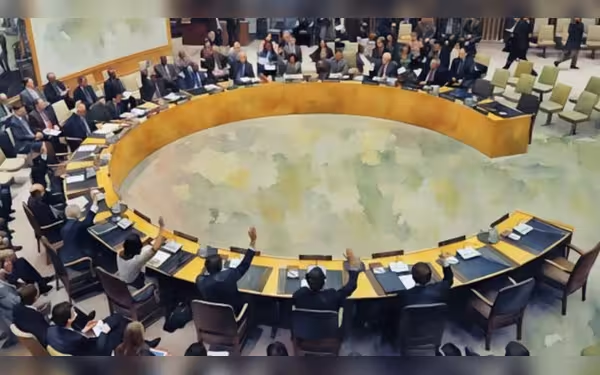Saturday, November 16, 2024 07:40 PM
Global Peace Under Siege: The Veto Power Crisis
- Escalating violence in Gaza raises global concerns.
- Powerful nations prioritize interests over humanitarian aid.
- Oxfam report highlights UN Security Council's ineffectiveness.
 Image Credits: thefridaytimes
Image Credits: thefridaytimesThe world faces a looming crisis as powerful nations prioritize interests over humanitarian aid, highlighting the UN Security Council's failures.
The world is currently facing a dire situation, with the threat of catastrophic war looming large. The ongoing conflict in Gaza, which has seen relentless violence since October 7, 2022, is just one part of a larger crisis that is spreading across the Middle East. Countries like Lebanon, Yemen, Syria, and Iran are becoming increasingly involved, raising concerns about a wider regional conflict. Despite the existence of organizations like the Organization of Islamic Cooperation (OIC) and the Arab League, efforts to stop the violence have been largely ineffective. These groups, which are supposed to promote unity and peace among Muslim nations, have failed to take significant action against Israel's military actions in Gaza.
As the situation escalates, many are questioning why wealthy Arab nations, which possess considerable resources and influence, have not intervened more forcefully to halt the violence. The OIC and the Arab League have issued statements calling for peace, but these have been described as weak and lacking in substance. Meanwhile, the United Nations, established after World War II to prevent such conflicts, appears to be struggling to fulfill its mission. Instead of acting decisively, it has become a platform for empty rhetoric, failing to provide the necessary solutions to ongoing global crises.
A recent report by Oxfam, titled "Vetoing Humanity: How a few powerful nations hijacked global peace and why reform is needed at the UN Security Council," highlights the troubling dynamics at play. The report reveals that a small number of powerful nations, representing only 25% of the world’s population, have manipulated global peace efforts to serve their own interests. Between 2014 and 2024, these nations used their veto power to block 30 resolutions aimed at addressing various crises, including those in Palestine, Ukraine, Syria, and Yemen. This selective engagement has left many conflicts unresolved, resulting in immense human suffering.
According to the Oxfam report, over the last decade, conflicts have claimed the lives of 1.1 million people across 23 crises. Millions have been displaced, and the number of people requiring humanitarian assistance has skyrocketed. The report emphasizes that the current structure of the UN Security Council (UNSC) is no longer effective in addressing the needs of the global community. The P5 nations (the United States, United Kingdom, France, China, and Russia) often prioritize their own geopolitical interests over the urgent need for humanitarian aid.
One of the most alarming findings of the report is the stark contrast between military and humanitarian aid provided by these powerful nations. In 2021, arms exports from the P5 exceeded $90 billion, far surpassing the humanitarian funding needed to address global crises. This imbalance raises questions about the true motivations behind military support, suggesting that profit often takes precedence over genuine security concerns.
As the world stands on the brink of potential disaster, it is crucial for nations to come together and prioritize global peace over political agendas. The Oxfam report serves as a wake-up call, urging member states to seize the opportunity for reform and create a more equitable and responsive international system. Only through collective action and genuine commitment to humanitarian principles can we hope to avert further conflict and suffering.
The current state of global affairs demands urgent attention and action. The ongoing crises in Gaza and beyond are not just regional issues; they are a reflection of a broken system that prioritizes power over people. It is imperative for the international community to recognize the need for change and to work towards a future where peace and justice are at the forefront of global governance.













